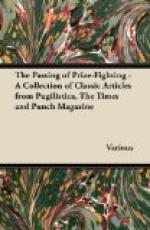* * * * *
I rather suspect Mrs. GERTRUDE ATHERTON of having written The Avalanche (MURRAY) either for the amusement of exercise in an unfamiliar medium, or, well, for any motive that might explain a production certainly not quite up to her own standard. Its publishers (who may be prejudiced) consider The Avalanche as “a brilliant and engaging study of mystery and romance;” me it impressed as a melodrama dependent on one long-heralded sensation, which proves on tardy arrival an affair of disappointment. I suppose I must be careful not to give away the mystery, such as it is. Price Rugler was anxious to discover why his attractive wife assumed a worried look when money was mentioned and fainted on being told that she was not to wear the family ruby at a particular masque. All this happened (you may not be astonished to hear) in San Francisco, amongst that luxurious, idle, over-moneyed society whose manners Mrs. ATHERTON knows and describes so well. Price had already found out, with the assistance of a not too brilliant detective, that his wife’s mother derived her income from a gambling saloon; the remaining problem was how to link up this knowledge with the odd behaviour of Mrs. Price. Perhaps you see it already. She had been—No, I said I wouldn’t, and I won’t. Of course the discovery couldn’t be called cheerful, though it was fortunately made in time to prevent any great harm. But it was nothing like an avalanche.
* * * * *
[Illustration: UNRECORDED HISTORY.
INCONSIDERATE FLAPPER WAYLAYS KING JOHN ON HIS RETURN
FROM SIGNING MAGNA
CARTA AT RUNNYMEDE.]
* * * * *
It is much harder, I am afraid, to be a good Bengali than a good Englishman. Nikhil, the Rajah of Sir RABINDRANATH TAGORE’S The Home and the World (MACMILLAN), persists in treating Sandip Babu (a convinced Nietzchean in philosophy and a Nationalist of the most inflammable type) as an honoured guest of his household, in spite of the fact that he differs from the fellow profoundly on every conceivable topic and is well aware, moreover, that Sandip is rapidly winning the heart of his Rani, Bimala. Nikhil, you see, considers




